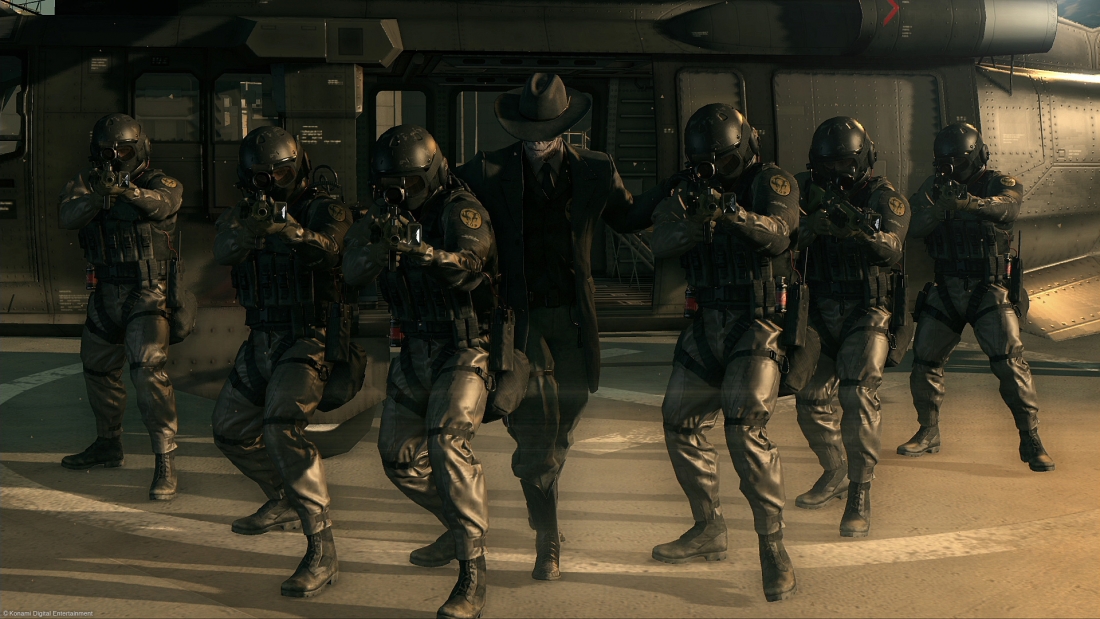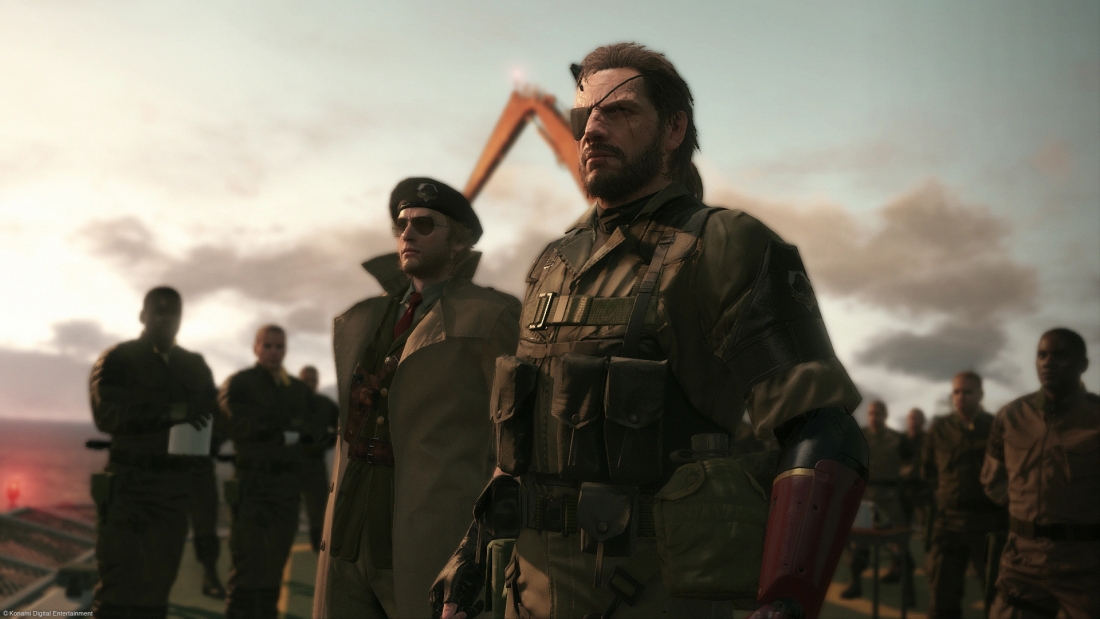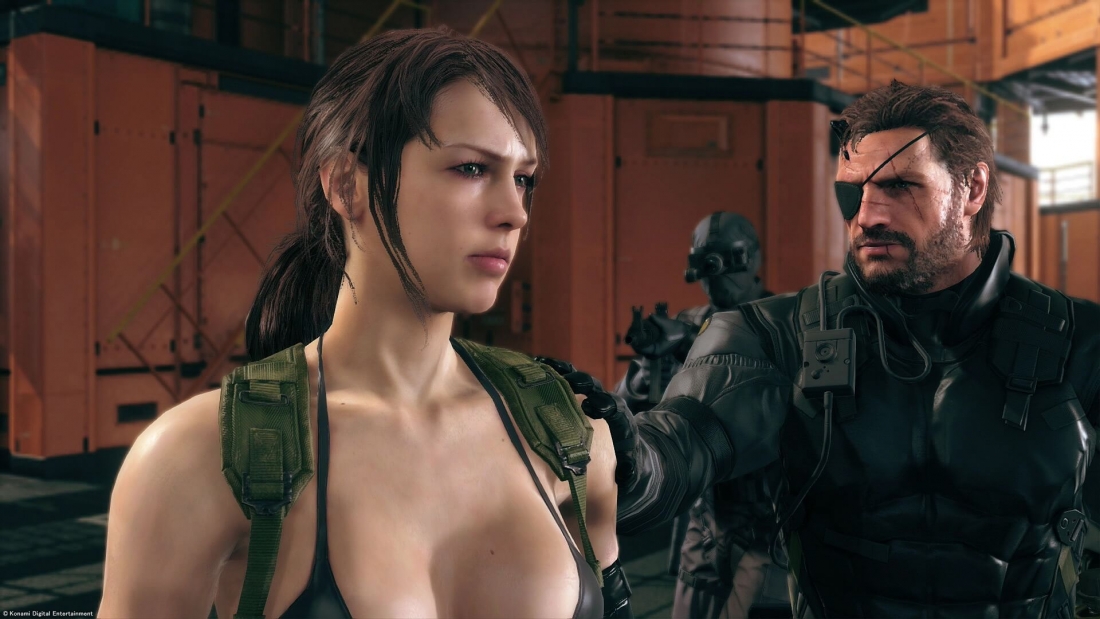
After more than 30 hours with the newest Metal Gear Solid, I'm convinced that Phantom Pain is the best Metal Gear yet, a game with extraordinary scope, inimitable style, and some of the most satisfying sneaking and creeping I've ever performed either in a video game or IRL. Particularly diehard fans might be miffed at how far The Phantom Pain has strayed from the formula established by Hideo Kojima's first few Metal Gear Solid games, but in my eyes, just about every change is welcome. Older Metal Gear Solids had baffling controls, odd camera angles, and an incomprehensible story. Metal Gear Solid V has easy controls, a great camera, and... an incomprehensible story.
Whereas previous Metal Gear Solid games took you through a linear, structured sequence of events---first you go through the tanker, then you go through the plant, etc.---The Phantom Pain is way more flexible, replacing chapters and segments with a large list of selectable missions, not unlike the portable Metal Gear Solid: Peace Walker. There are around 50 of these missions, and you'll do them roughly sequentially, but you might get to pick the order of, say, missions 3, 4, and 5. You can also pick one of a variety of optional side operations---some of which aren't actually all that optional---or just wander freely around one of the game's big maps, which include chunks of Afghanistan, Africa, and a small set of platforms on the Indian Ocean called Mother Base. Unlike any Metal Gearbefore it, it's all very open.
Metal Gear Solid V: The Phantom Pain is out today for PC and consoles. A full review and performance testing on PC hardware will follow soon. But this is a very big game, and I haven't even come close to finishing yet, so Kotaku's full review won't be out just yet.
For now, allow me to give you some spoiler-free impressions of Metal Gear Solid V based on a few dozen hours worth of sneaking, shooting, and resetting. Let's break this down.
- If you've played Ground Zeroes, the $20 prologue Konami released in early 2014, you've probably got an idea of what to expect from The Phantom Pain. The core rhythm is very similar: You'll start off each mission by scouting out a base or camp with your binoculars, which you can use to tag enemy soldiers so you can track their movements. Then you get to work, either sneaking around with a tranquilizer or blasting away with big guns---your call---to achieve some sort of objective, which usually involves either taking out a target, rescuing prisoners, or some combination of the two. You can interrogate enemy soldiers for intel on your surroundings. Sometimes you blow things up.
- Unlike Ground Zeroes, however, The Phantom Pain has more than one camp, and some missions will task you with---get this---moving between different camps. Astounding!
- MGSV gives you incentive to avoid murdering people with a gadget called the Fulton Recovery Device, which attaches a balloon to stunned enemy soldiers and sends them back to your home base to be brainwashed and recruited into your army. (If you've played Peace Walker, you've seen this one before.) It's still incredibly tough to play through every mission without killing anyone, but I'm sure someone will do it and be featured onKotaku within 24 hours after the game comes out.
- To develop that home base---Mother Base---you can build out facilities, assign your staff to different groups (R&D, Support, Intel, etc.), and deploy combat units to go on support missions and bring you stuff, like cash or new volunteers.
- Many things about Mother Base are disappointing. The zone itself is big, empty, and boring, while the menu-driven interface for assigning staff and developing weapons is messy and convoluted. (I know what you're thinking: "Metal Gear Solid? Messy and convoluted? No!") There's a certain satisfaction to Fultoning men on the field, but after a certain point it turns into a chore.
- That said, regularly sending out combat units and recruiting new soldiers is the only way to get new weapons and equipment, so you pretty much have to keep up with Mother Base if you want to make progress. I've found a good rhythm in picking people up and assigning them to build me things, so it's really not so bad.
- As you explore the world, you can pick up resources and herbs, because I guess it wouldn't be an open-world game if you couldn't pick up herbs. This also helps you develop new stuff at Mother Base.
- Mother Base gripes aside, I must say, systematically dismantling enemy camps by scouting them out, screwing with guards, and kidnapping people with balloons is unbelievably satisfying. There are so many different ways you can approach each new problem, thanks to Snake's standard collection of gadgets and some smart level design that turns every enemy fortress into a playground for you to explore. Whenever you think there might be a hidden tunnel or useful item somewhere in the field, you're probably right.
- Speaking of things that are unbelievable, I still can't fathom the technical wizardry behind this game. It runs at a locked 60 frames-per-second (I'm playing on PS4), which is a buzzword you might be sick of in 2015, but for a game with precise movements like MGSV the framerate makes a hugedifference. And no matter how many explosions go off in the field, the game has never once stuttered for me. Not a single frame drop. Combined with Snake's great animations, this locked framerate makes every action inMGSV feel perfect. Slithering on the ground, body-slamming enemies, climbing up ladders---it all looks and sounds great, especially compared to the jankiness of something like The Witcher 3 on consoles.
- The Phantom Pain looks incredible, too---anyone who's played an open-world video game might be conditioned to expect pop-in or other weird technical glitches when peering through binoculars or down the barrel of a sniper rifle, but Metal Gear Solid V is as smooth as it gets. It'd be a serious crime if Konami prevents anyone else from using this game's technology---a set of tools called the FOX Engine---for anything but pachinko tables.
- The game did crash on me once, though. I blame nanomachines.
- Quiet's outfit has an actual explanation. Really! It's, uh, strange, but it's there!
- I've died a lot. This game can get hard, especially if you're the type of player who, like me, has a tendency to commit suicide every time they get caught. One particular mission---which tasked me with stealing a convoy truck and escaping from a platoon of supernaturally-gifted enemies---took me way longer to beat than I'd ever admit in public.
- I haven't said much about the story---that's intentional!---but I will say that I have yet to see a cutscene that's run longer than a few minutes, other than the prologue, which lasts about an hour and a half and is essentially a cinematic tutorial. It's flashy and crazy and it makes absolutely no sense. I loved it.
- A great deal of the plot is told through optional cassette tapes that you can play any time, even when you're on a mission. These tapes have replaced the CODEC system, which is yet another welcome change, because listening to expository dialogue is wayyyy more palatable when you can do other stuff at the same time. This is where Kiefer Sutherland (the new Snake, replacing David Hayter) gets most of his lines, oddly.
- Sometimes, though, Snake's bros (Ocelot and Miller) will start jabbering about the mission while you're trying to listen to a tape, which can get annoying as the tape won't automatically pause, even when Kaz is explaining that you just picked up a black carrot, an ancestor of the orange carrot.
- Every mission both starts and ends with a credit sequence that puts Hideo Kojima's name front and center, which feels sort of like a final "fuck you" to Konami after that whole box art thing.
- A number of readers have asked me whether they should support this game in the wake of reports that Konami treats its staff like prisoners. I don't have an answer to that question other than to point out that yes, those reports exist and they can't be ignored, as video games are created by human beings. No game lives in a vacuum, as much as we'd sometimes prefer it if they all did.

Earlier this year, when I previewed Metal Gear Solid V: The Phantom Pain after a two-hour session at Konami's offices in Los Angeles, I wrote that "few games make you feel like as much of a supersoldier." Thirty hours later, that's still true. There's nobody like Snake, and there's nothing like Metal Gear Solid---plenty of other games let you sneak and shoot around a big open world, but none of them have the style, the tone, or the totally inappropriate gravitas of this series. I imagine that The Phantom Pain's structure will lead to some incredible player war stories. "Hey, remember the time I made my horse poop on the road to derail an enemy car, then set my cassette player to Aha's Take On Me and shot up everyone inside?"
Metal Gear Solid V: The Phantom Pain is out today for PC and consoles. A full review and performance testing on PC hardware will follow soon.

